A list of films released in Japan in 2006 (see 2006 in film).
A list of films released in Japan in 2006 (see 2006 in film).
| Rank | Title | Director | Cast | Gross |
|---|---|---|---|---|
| 1 | Tales from Earthsea | Gorō Miyazaki | Junichi Okada | ¥7.65 billion |
| 2 | Limit of Love: Umizaru | Eiichirō Hasumi | Hideaki Itō | ¥7.1 billion |
| 3 | The Uchōten Hotel | Kōki Mitani | Kōji Yakusho | ¥6.08 billion |
| 4 | Nihon Chinbotsu | Shinji Higuchi | Tsuyoshi Kusanagi | ¥5.34 billion |
| 5 | Death Note 2: The Last Name | Shusuke Kaneko | Tatsuya Fujiwara | ¥5.2 billion |
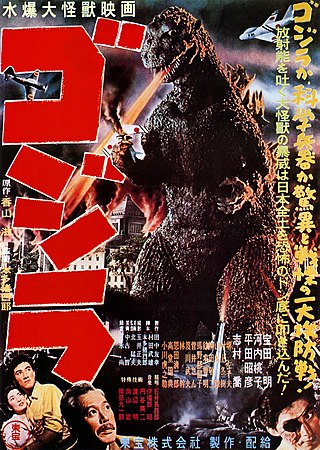
Godzilla is a 1954 Japanese epic kaiju film directed and co-written by Ishirō Honda, with special effects by Eiji Tsuburaya. Produced and distributed by Toho Co., Ltd., it is the first film in the Godzilla franchise. The film stars Akira Takarada, Momoko Kōchi, Akihiko Hirata, and Takashi Shimura, with Haruo Nakajima and Katsumi Tezuka as Godzilla. In the film, Japan's authorities deal with the sudden appearance of a giant monster, whose attacks trigger fears of nuclear holocaust in post-war Japan.

Hayao Miyazaki is a Japanese animator, filmmaker, and manga artist. A co-founder of Studio Ghibli, he has attained international acclaim as a masterful storyteller and creator of Japanese animated feature films, and is widely regarded as one of the most accomplished filmmakers in the history of animation.
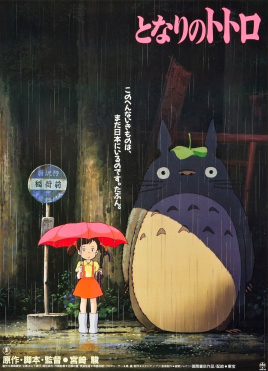
My Neighbor Totoro is a 1988 Japanese animated fantasy film written and directed by Hayao Miyazaki and animated by Studio Ghibli for Tokuma Shoten. It stars the voices of Noriko Hidaka, Chika Sakamoto and Hitoshi Takagi, and focuses on two young sisters and their interactions with friendly wood spirits in postwar rural Japan.

Princess Mononoke is a 1997 Japanese animated epic historical fantasy film written and directed by Hayao Miyazaki and animated by Studio Ghibli for Tokuma Shoten, Nippon Television Network and Dentsu. The film stars the voices of Yōji Matsuda, Yuriko Ishida, Yūko Tanaka, Kaoru Kobayashi, Masahiko Nishimura, Tsunehiko Kamijo, Akihiro Miwa, Mitsuko Mori, and Hisaya Morishige.

Spirited Away is a 2001 Japanese animated fantasy film written and directed by Hayao Miyazaki, animated by Studio Ghibli for Tokuma Shoten, Nippon Television Network, Dentsu, Buena Vista Home Entertainment, Tohokushinsha Film, and Mitsubishi and distributed by Toho. Spirited Away tells the story of Chihiro "Sen" Ogino, a ten-year-old girl who, while moving to a new neighborhood, inadvertently enters the world of kami. After her parents are turned into pigs by the witch Yubaba, Chihiro takes a job working in Yubaba's bathhouse to find a way to free herself and her parents and return to the human world.

Rashomon is a 1950 Jidaigeki drama film directed and written by Akira Kurosawa, working in close collaboration with cinematographer Kazuo Miyagawa. Starring Toshiro Mifune, Machiko Kyō, Masayuki Mori, and Takashi Shimura as various people who describe how a samurai was murdered in a forest, the plot and characters are based upon Ryunosuke Akutagawa's short story "In a Grove", with the title and framing story being based on "Rashōmon", another short story by Akutagawa. Every element is largely identical, from the murdered samurai speaking through a Shinto psychic to the bandit in the forest, the monk, the assault of the wife and the dishonest retelling of the events in which everyone shows their ideal self by lying.
The following is an overview of events in 2006, including the highest-grossing films, award ceremonies and festivals, a list of films released and notable deaths. Pixar celebrated its 20th anniversary in 2006 with the release of its 7th film, Cars.

Kiki's Delivery Service is a 1989 Japanese animated fantasy film written, produced, and directed by Hayao Miyazaki, based on the 1985 novel of the same name by Eiko Kadono. It was animated by Studio Ghibli for Tokuma Shoten, Yamato Transport and the Nippon Television Network, and stars the voices of Minami Takayama, Rei Sakuma and Kappei Yamaguchi. The story follows Kiki, a young witch who moves to the port city of Koriko with her cat Jiji and starts a flying courier service.
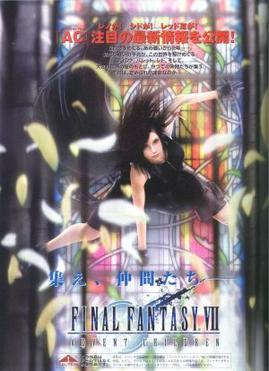
Final Fantasy VII: Advent Children is a 2005 Japanese computer-animated science fantasy action film directed by Tetsuya Nomura, written by Kazushige Nojima, and produced by Yoshinori Kitase and Shinji Hashimoto. Developed by Visual Works and Square Enix, Advent Children is part of the Compilation of Final Fantasy VII series of media, which is based in the world and continuity of the 1997 role-playing video game Final Fantasy VII. Final Fantasy VII: Advent Children was released on DVD and Universal Media Discs with Japanese voice acting in Japan on September 14, 2005, and on April 25, 2006 with English voice acting in North America and the UK.

Tokyo Story is a 1953 Japanese drama film directed by Yasujirō Ozu and starring Chishū Ryū and Chieko Higashiyama, about an aging couple who travel to Tokyo to visit their grown children.

Death Note is a Japanese manga series written by Tsugumi Ohba and illustrated by Takeshi Obata. It was serialized in Shueisha's shōnen manga magazineWeekly Shōnen Jump from December 2003 to May 2006, with its chapters collected in 12 tankōbon volumes. The story follows Light Yagami, a genius high school student who discovers a mysterious notebook: the "Death Note", which belonged to the shinigami Ryuk, and grants the user the supernatural ability to kill anyone whose name is written in its pages. The series centers around Light's subsequent attempts to use the Death Note to carry out a worldwide massacre of individuals whom he deems immoral and to create a crime-free society, using the alias of a god-like vigilante named "Kira", and the subsequent efforts of an elite Japanese police task force, led by enigmatic detective L, to apprehend him.
A media franchise, also known as a multimedia franchise, is a collection of related media in which several derivative works have been produced from an original creative work of fiction, such as a film, a work of literature, a television program or a video game. Bob Iger, chief executive of the Walt Disney Company, defined the word franchise as "something that creates value across multiple businesses and across multiple territories over a long period of time".
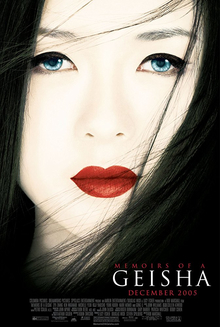
Memoirs of a Geisha is a 2005 American epic period drama film directed by Rob Marshall and adapted by Robin Swicord from the 1997 novel of the same name by Arthur Golden. It tells the story of a young Japanese girl, Chiyo Sakamoto, who is sold by her impoverished family to a geisha house to support them by training as and eventually becoming a geisha under the pseudonym "Sayuri Nitta." The film centers around the sacrifices and hardship faced by pre-World War II geisha, and the challenges posed by the war and a modernizing world to geisha society. It stars Zhang Ziyi in the lead role, with Ken Watanabe, Gong Li, Michelle Yeoh, Youki Kudoh, Suzuka Ohgo, and Samantha Futerman.
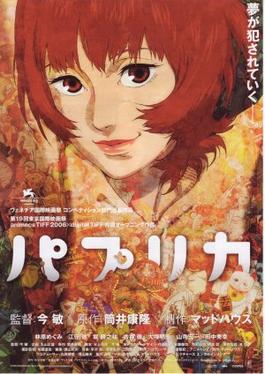
Paprika is a 2006 Japanese adult animated science fiction psychological thriller film directed by Satoshi Kon. The film is based on the 1993 novel of the same name by Japanese author Yasutaka Tsutsui. It is Kon's fourth and final feature film before his death in 2010. The script was co-written by Kon and Seishi Minakami, who also wrote for Kon's TV series Paranoia Agent, the character design and animation director was Masashi Ando, the music was composed by Kon's frequent collaborator Susumu Hirasawa, and the art director was Nobutaka Ike, who worked on all of Kon's works. Japanese animation studio Madhouse animated and produced the film. The Japanese voice cast featured Megumi Hayashibara, Tōru Emori, Katsunosuke Hori, Tōru Furuya, Akio Ōtsuka, Kōichi Yamadera and Hideyuki Tanaka.

Rinko Kikuchi is a Japanese actress. She was the first Japanese actress to be nominated for an Academy Award in 50 years, for her work in Babel (2006). Kikuchi's other notable films include Norwegian Wood (2010), which screened in competition at the 67th Venice Film Festival and Guillermo del Toro's science fiction action film Pacific Rim (2013). For her role in the drama film Kumiko, the Treasure Hunter (2014), Kikuchi received an Independent Spirit Award nomination for Best Female Lead. In 2022, she starred in the HBO Max crime drama series Tokyo Vice.
Lists of films produced in Japan include:
The following are lists of films produced in Japan in the 2000s:
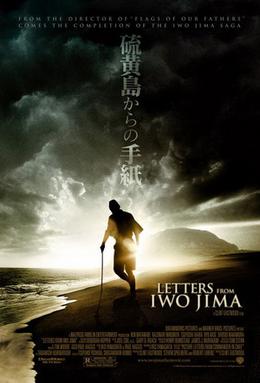
Letters from Iwo Jima is a 2006 Japanese-language American war film directed and co-produced by Clint Eastwood, starring Ken Watanabe and Kazunari Ninomiya. The film portrays the Battle of Iwo Jima from the perspective of the Japanese soldiers and is a companion piece to Eastwood's Flags of Our Fathers, which depicts the same battle from the American viewpoint; the two films were shot back to back. Letters from Iwo Jima is almost entirely in Japanese, despite being co-produced by American companies DreamWorks Pictures, Malpaso Productions and Amblin Entertainment.

Kinema Junpo, commonly called Kinejun (キネ旬), is Japan's oldest film magazine and began publication in July 1919. It was first published three times a month, using the Japanese Jun (旬) system of dividing months into three parts, but the postwar Kinema Junpō has been published twice a month.